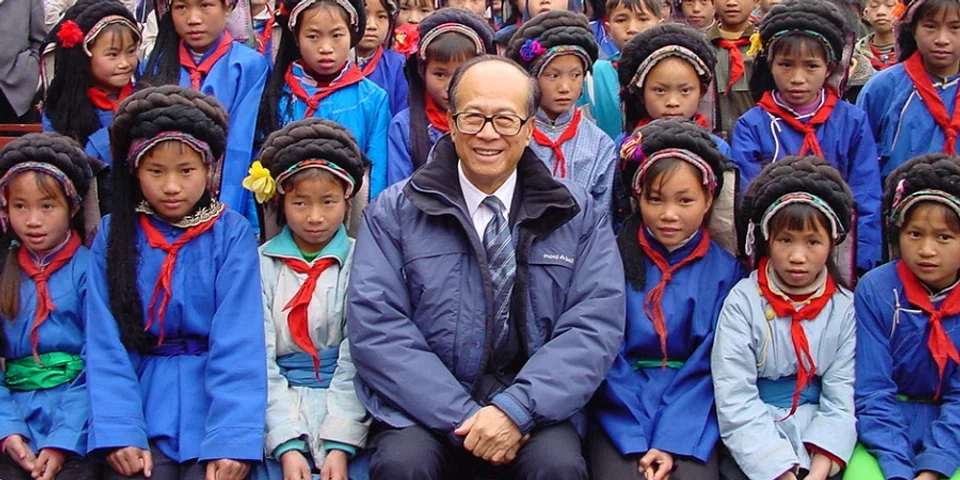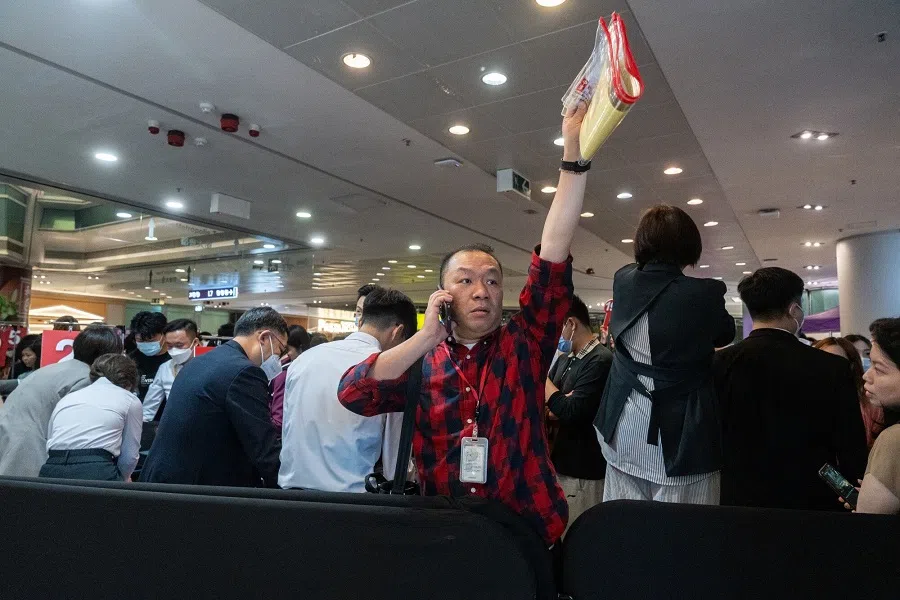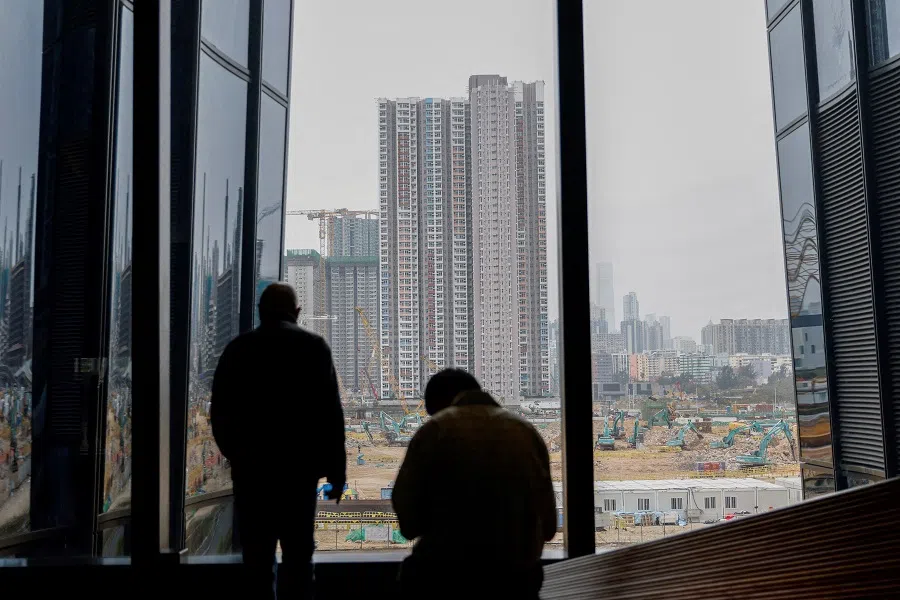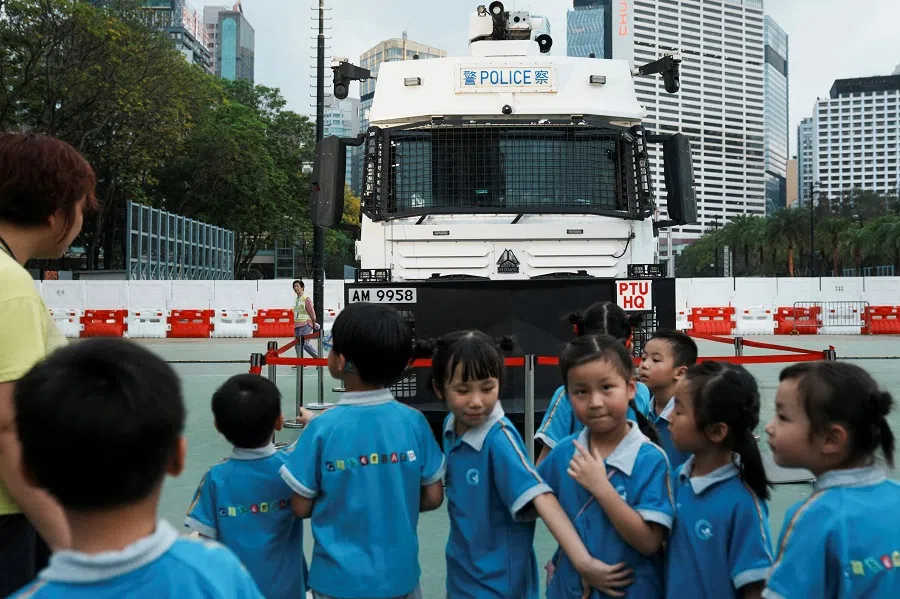Are Hong Kong tycoon Li Ka-shing’s moves still a bellwether for investors?
Hong Kong tycoon Li Ka-shing’s moves have always been highly watched by investors and the public alike. The pivot to Hong Kong and the mainland by CK Asset Holdings, founded by Li and helmed by his son Victor Li, has rekindled discussions as to whether the Li family is shifting its strategic focus back to China. Lianhe Zaobao’s China Desk looks into the recent activities of Li and his group of companies amid a turbulent economic environment.

Hong Kong tycoon Li Ka-shing is once again selling houses at slashed prices.
After rolling out houses at 30% cheaper than neighbouring new flats in August last year, CK Asset Holdings, founded by Li and helmed by his son Victor Li, launched another housing development, the Blue Coast, in April this year. These homes were offered at more than 20% below cost price, with the lowest-priced unit selling for HK$18,998 (US$2,808) per square foot. Even sales agents are calling this “bottom-fishing prices”.
As one of the new developments with the largest number of units launched on a single day following the removal of all property market cooling measures in Hong Kong, the Blue Coast sold over 400 units on its first sales day on 6 April, raking in a single-day sales of HK$7.5 billion, a ten-year high.
Thirty percent of the buyers were from mainland China. Kwok Tze Wai, chief manager of CK Asset’s sales department, said at a prior real estate presentation that he hopes to attract the attention of more mainland Chinese buyers through various offline channels.
Mainland Chinese financial media platforms analysed that these properties had been put out by Li and his son to “hunt” for the wealthy in mainland China.

This is not only reflected in the fact that they timed their launch right when the Hong Kong government removed all property market cooling measures and mainland Chinese tourists are snapping up homes in Hong Kong, but also in the fact that the demand for property was accurately matched with the demand for mainland Chinese talents coming to work in Hong Kong through the Top Talent Pass Scheme (TTPS).
... if there are 8,000 of such talents and each of them happen to purchase one CK Asset’s projects, they are actually short of houses for this income group.
Targeted at mainland Chinese buyers
To boost the lacklustre property market, the Hong Kong government announced the removal of measures to curb housing demand on 28 February, meaning that non-Hong Kong residents will no longer have to pay a 15% stamp duty when purchasing properties, but only around 4.25%, on par with Hong Kong residents.
Statistics from Midland Realty found that Hong Kong’s new home transactions hit an 11-year high in March, with 4,170 sales. Securities Times reported that the number of inquiries from mainland Chinese buyers about purchasing properties in Hong Kong has increased by 40 to 50 times, many of whom had inquired via the TTPS.
At a project kick-off meeting on 15 March, Kwok revealed that CK Asset has a clear target: elites with a monthly salary of HK$100,000 or above. And this elite group comes from the TTPS.
He pointed out that this group of talents earn a median-to-above-average monthly income of HK$50,000, while another 30% of them earn over HK$100,000 a month. They have high purchasing power and are highly motivated to buy a house. He noted that given a population of over 80 million people in the Greater Bay Area of Guangdong, Hong Kong and Macau, if there are 8,000 of such talents and each of them happen to purchase one CK Asset’s projects, they are actually short of houses for this income group.
Kwok added that CK Asset also plans to offer them a series of complementary services, including legal advice on living and studying in Hong Kong, and rental arrangements before purchasing a home.

He even revealed that CK Asset will be conducting roadshows in first-tier mainland Chinese cities such as Shenzhen, Beijing and Shanghai this year; the last time the company did so was in 2017.
CK Asset’s pivot towards Hong Kong and the mainland has rekindled discussions as to whether the Li family is shifting its strategic focus back to China.
Returning to China?
Since 2013, Li has been selling off assets in the mainland and acquiring properties in the UK. In 2015, Xinhua-affiliated Liaowang Institute (瞭望智库) published an article titled “Don’t Let Li Ka-shing Get Away”, which claimed that Li had continually sold his assets in the mainland and disregarded official support, arguing that Li has lost the moral high ground. This article even made Li the target of public opinion at one point. Li responded to the article, asserting that the tone sent a shudder down his spine.
However, in 2020, Li started to sell his UK assets and looked towards the Hong Kong and mainland markets again.
In 2020, CK Infrastructure announced a joint venture with Jilin Power, a unit of State Power Investment Corporation, to develop a smart energy programme. In 2022, Hutchison Whampoa, which has been taken over by Victor Li, participated in a land auction in Guangzhou, marking the company’s return to land auctions in mainland China in nearly a decade. That same year, CK Asset submitted a bid for China Evergrande Centre in Wan Chai.
In June 2023, CK Asset made moves once again, working together with HSBC in an attempt to acquire a majority stake in the project loan for Hong Kong’s luxury apartment building, The Corniche, from two mainland property firms — Shenzhen’s Logan Group and Guangzhou’s KWG Group Holdings. According to media reports, Li Ka-shing appeared in Guangzhou during the process of this deal.
With the current real estate market persistently sluggish, the interactions between Li and his companies, and mainland China and Hong Kong have caused many investors to wonder: did Li Ka-shing see something others did not?

It was also from last year onwards that Li, who was rarely in the public eye, began to appear more frequently in the news. At the end of July 2023, Li returned to his hometown of Chaoshan, and in accordance with the traditions of his hometown, celebrated his 96th birthday, in Chinese nominal age, together with his employees.
In February 2024, Wen Zhanbin, Chinese Communist Party secretary for Shantou, made a trip to Hong Kong to meet with Li. The latter expressed that he would give his all to contribute to his country and the society, and is willing to continue supporting the development of education and the medical industry in his hometown to give back and to benefit the people.
With the current real estate market persistently sluggish, the interactions between Li and his companies, and mainland China and Hong Kong have caused many investors to wonder: did Li Ka-shing see something others did not? Many have referenced a classic quote by Warren Buffett to annotate Li’s return: “Be greedy when others are fearful, and be fearful when others are greedy.”
Chen Jinsong, chair of Shenzhen World Union Group, told Phoenix Weekly, “When the real estate slump ends, golden opportunities will be aplenty, and capital returns would be all prepared. Li is a seasoned veteran when it comes to real estate. This is not a case of whether to view Hong Kong positively or negatively, or whether or not to pull out all funds; this is a market issue.”
However, for the five publicly listed companies owned by the Li family, excluding HK Electric which focuses on the Hong Kong market, the primary source of revenue remains the UK market.
Trapped in the UK market
Selling property to make returns on capital and increased interaction aside, it is still too early to judge whether the situation has reached a turning point. Currently, the core assets managed by the Li family are still in the UK.

According to a report by the Financial Times, after a wave of purchasing, the Li family owns around 25% of the UK’s electricity distribution market, nearly 30% of its natural gas market, close to 7% of its water supply market, over 40% of its telecommunications market, nearly a third of ports in the UK, and over 500,000 square metres of land assets. They were at one point said to have “purchased half of the UK”.
An article on the finance platform Wave (巨潮) highlights Li’s ongoing divestment from the UK since 2020. This includes the sale of its wireless transmission towers business in Europe for 10 billion euros (US$10.95 billion), and the sale of 5 Broadgate, a grade A commercial building in London, for 729 million pounds (US$788 million), among others. However, for the five publicly listed companies owned by the Li family, excluding HK Electric which focuses on the Hong Kong market, the primary source of revenue remains the UK market.
From the 2023 financial report, UK telecommunications firm Three UK contributed to nearly 30% of revenue for CK Hutchison, while UK pub operations accounted for half of CK Asset’s revenue, with businesses in the UK the biggest source of profit for CK Infrastructure and Power Assets Holdings.
However, since the second half of 2023, the UK economy has gone into a slump, with economic growth for the year down 0.7% — its worst performance in nearly half a century. Both CK Asset’s and CK Hutchison’s performance took a hit, with profits down 20% and 30% respectively.
In actuality, since 2022 when the pound was at its weakest since Brexit, media reports said that Li was turning his attention towards Vietnam. In April 2022, Justin Chiu, executive director of CK Asset, made a research trip to Vietnam, which was set up by Vietnamese real estate firm VTP Group.

But such plans were halted with the arrest of Truong My Lan, chair of VTP Group and Vietnam’s richest woman, in October 2022. She was sentenced to death in April 2024. Besides the telecommunications business the Li family originally had in Vietnam, plans for real estate development remain unclear.
During an economic upswing, Li moved his funds around the globe, often pulling out just before a crisis hit, making him an investor’s bellwether. But during this downturn, “Superman Li” has aged and the market changed; where would the next stop be? Vietnam? China? It is yet unknown if Li is able to rise from shallow waters and make a successful pivot.
This article was first published in Lianhe Zaobao as “李嘉诚又回来了?”.


![[Big read] When the Arctic opens, what happens to Singapore?](https://cassette.sphdigital.com.sg/image/thinkchina/da65edebca34645c711c55e83e9877109b3c53847ebb1305573974651df1d13a)


